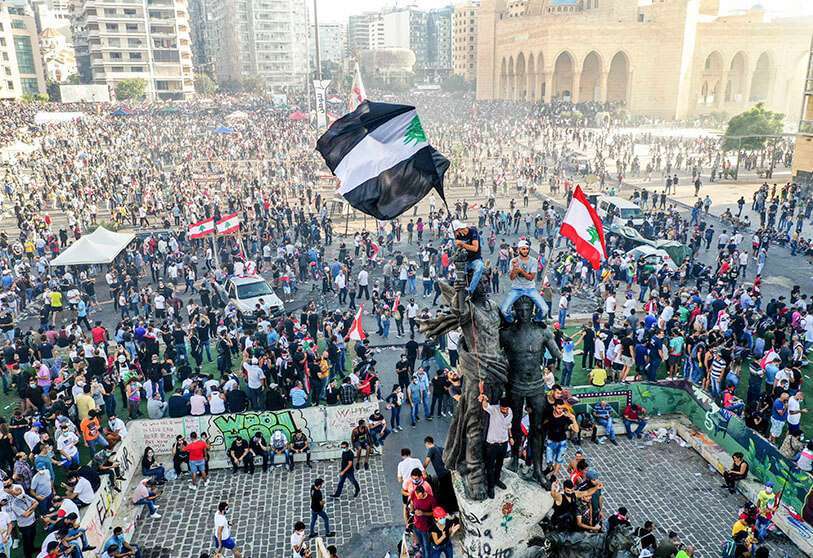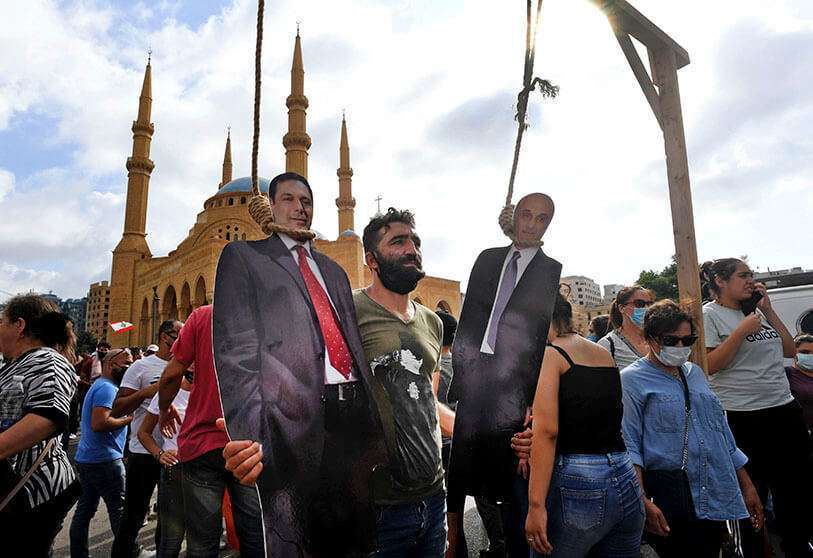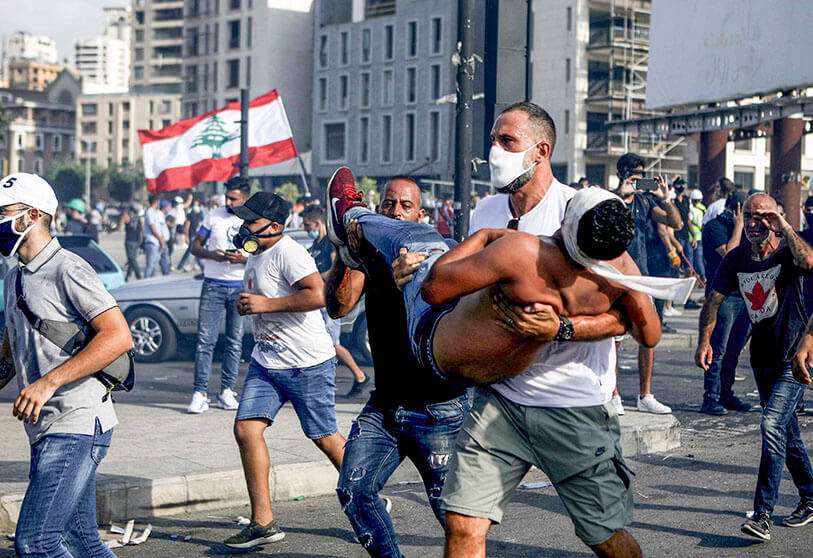One year on, Lebanon fights for survival

Anger and rage conquered every corner of Lebanon on 4 August. The huge explosion in the port of Beirut reopened the unhealed wounds of a 15-year civil war in the country of the Cedar. Since the explosion in Lebanon's capital, the repercussions have been felt at every possible level. The bad times have been hard on this Levantine country of 4.5 million inhabitants, which is facing a triple crisis: health, economic and political-social. Meanwhile, anger prevails against a ruling class that has been unable to form a government ever since. Only the solidarity of its citizens serves as a balm for the scars that are as visible on the buildings as on their inhabitants.
The tragedy in the port of Beirut that forever changed the lives of its citizens came at a time when the country's economy was in the doldrums. Lebanon's collapsing currency, rising inflation and deepening financial crisis have exacerbated political tensions in the nation. Power outages, lack of clean water and petrol shortages have become part of the daily routine for many of the country's citizens. Lebanon - a country of nearly five million people and home to more than 1.5 million refugees - is one of the world's most indebted nations. This instability has been intensified by the emergence of the coronavirus, which has put the country's healthcare system on the ropes.

The explosion claimed the lives of 205 people, injured more than 6,500, with damage estimated at up to $5 billion, displaced another 350,000 residents from their homes, destroyed numerous buildings, left large numbers of people homeless, at a critical time for many Lebanese, who have lost their jobs due to the COVID-19 pandemic. One year on from what is considered one of the most powerful non-nuclear explosions the world has ever seen, in this unstable scenario, Lebanese society is still crying out for answers and wondering where its leaders are. After it became known that the explosion was caused by the deflagration of more than 2,500 tonnes of ammonium nitrate, which had been stored in the port of Beirut without proper precautions, public outrage has been growing ever since.
The collapse of the currency, rising inflation and Lebanon's deep financial crisis, coupled with this explosion and the coronavirus pandemic, have exacerbated political tensions in a nation crying out for answers. Despite promises made at the time by political leaders to prosecute those responsible for the explosion, no details of the opaque and controversial official investigation have been made public. All theories point to the explosion being the result of a warehouse full of high-explosive materials that had been confiscated in recent years by the country's authorities.

Here begins the bizarre chain of errors that led to the explosion of 4 August. The story of this tragedy began eight years ago, when a Russian-chartered, Moldovan-flagged ship travelling from Georgia to Mozambique docked in Beirut. After a series of incidents, it was subjected to an inspection by port technicians who allegedly found deficiencies and prohibited it from resuming operations. The vessel, named Rhosus, flying the Moldovan flag, moored in the port of Beirut in late 2013 with a cargo of 2,750 tonnes of ammonium nitrate inside. The ship sailed from the port of Batumi (Georgia) to Beira (Mozambique). The reasons that led the Rhosus to stop in Beirut are still unclear. From the time the ammonium nitrate was unloaded in October 2014 in the port of Beirut until 2017, there were five official letters from port officials to the government warning of the dangerousness of the material and the risk it poses to the city and its population. No one did anything.
In February 2015, Lebanese judge Nadim Zwain sent an expert to analyse the cargo. He concluded that it should be immediately placed under the control of the Lebanese Army, which disregarded the ammonium nitrate and recommended its sale to a private company. One year after the explosion, 25 people have been arrested: the director general of customs, Badri Daher, together with 24 other responsible intermediaries at the port. On 10 December, Judge Fadi Sawan, who led the official investigation into the explosion, indicted Lebanon's acting Prime Minister Hassan Diab and three other former ministers for negligence. Diab refused to appear in court, as did two of the three other former ministers, who also requested a recusal of the judge. The Ministry of Interior backed the defendants by refusing to send officers to bring them to justice. However, the first judge appointed to the investigation, Fadi Sawan, was suspended in February after the two former ministers he had accused of criminal negligence requested that the Beirut Court of Cassation transfer the case to another judge, Tariq Bitar. But Judge Bitar has already run into the same barriers as his predecessor. Nevertheless, Judge Bitar is not giving up and has vowed to press ahead with the investigation that caused a deep crater in the port site, devastated homes, educational institutions and businesses in half the city, took the lives of hundreds of people and left 6,000 others badly injured.
These situations triggered massive protests that ended with his resignation on 10 August. He was replaced by Mustafa Adib, but he also resigned less than a month after taking office, citing difficulties between the different political parties in forming a cabinet. On 15 July, the former prime minister appointed after Adib's resignation, Saad Hariri, resigned again after being unable to reach an agreement with Lebanese President Michel Aoun to form a government. Meanwhile, the confrontation between the political class is keeping a society on tenterhooks as it waits for the formation of a government in order to be able to access the international aid it so desperately needs. Four prime ministers have been in power in the last year without any of them managing to form a stable government. The new figure charged with carrying out this practically impossible mission in the Mediterranean country is Sunni businessman Najib Mikati. It is clear that the return of the billionaire Mikati as prime minister faces major challenges.

One of the main stumbling blocks to proceeding with the investigation into the Beirut port bombing is the immunity of parliamentarians. The judge in charge of the case requested authorisation to investigate members of parliament and senior security officials. However, acting Interior Minister Mohamad Fahmi denied the judge's request, prompting the families of the victims to hold weekly protests every week since then in favour of an impartial and effective investigation. However, Lebanese President Michel Aoun said in a speech at the Baabda Palace on the eve of the first commemoration of the double deadly explosion in Beirut's port that since he himself has made himself available to justice and agreed to testify before the judge in charge of investigating the tragedy, no official has any excuse to claim immunity. For his part, Prime Minister Najib Mikati called for "justice to be done", asserting that "the homeland is in danger".
The picture remains apocalyptic in Lebanon one year after the tragedy, and the roots of this political and social instability lie in the country's economic and financial crisis. The collapse of the currency, rising inflation, coupled with this explosion and the coronavirus pandemic, have exacerbated political tensions in a nation crying out for answers. The Beirut port disaster was the spark that lit the fuse to a revolution long in the making. The spectre of corruption has not gone away in a Lebanon that does not understand how more than 2,700 tonnes of ammonium nitrate were allowed to be stored unchecked in the city's port for years, while the international community refuses to reflate its bankrupt economy without drastic anti-corruption reforms. Trust has broken down and the exchange of accusations or the unwillingness to find the source of the crisis has only worsened the situation.









